As a society we talk a lot about eating, weight loss, and healthy guidelines.
But are we really listening?
Believe it or not, eating is an addiction. There are meetings, Overeaters Anonymous, where people who have a tendency to overeat can share their experiences and support each other. While some people might think that it’s comical for anyone to look at eating as an addiction, it’s a difficult vice for people to overcome. Saying that these people should just get off the couch or start eating better is like telling a person suffering from depression “Hey, cheer up!”
There’s a lot more to it than that.
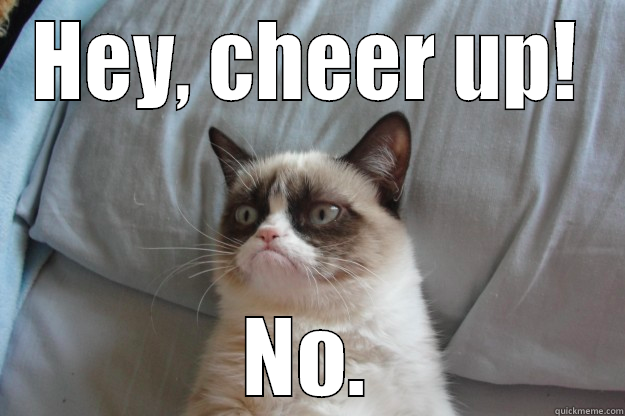
According to this treatment center, a person who’s struggling with overeating shouldn’t simply stop at the foods that are obviously unhealthy. They should take everything that’s filled with artificial ingredients, preservatives, or added sugars and throw it out the window. Good advice, no?
Cutting down consumption of these substances isn’t the answer; the end goal should be to avoid having artificial, unhealthy items in your house at all. The mere presence of them in might trigger something, causing a binge. This is why we don’t keep Oreos in our house!
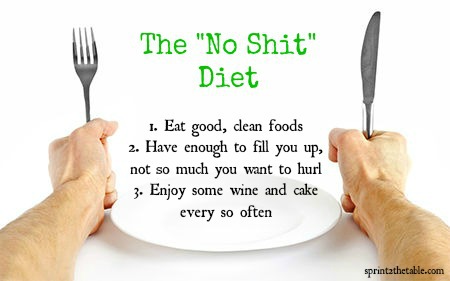
If you’ve been following my blog for a while, you may have seen my post on the “No Shit Diet.” The path towards having a healthy diet is not as complicated as people are making it out to be. You don’t need a special diet or to go paleo or vegan or whatever. Just eat good, clean foods, have enough to fill you up, and enjoy wine and cake every so often!
The last part is key. I see so many people make the mistake of cutting out everything they enjoy. In the process, they open themselves up to a joyless existence eating stuff they dislike eating in the first place. A person needs to have a treat now and then!
Your body will freak out because it fees deprived. This is where the addiction aspect comes in. Food that is seen as being “bad” triggers the reward center in a person’s brain. The brain becomes used to these rewards and expects they will be around indefinitely. It does not appreciate when these rewards are taken away. Don’t keep temptations in the house, but don’t be scared to go out and order dessert! Stress isn’t going to help anyone.
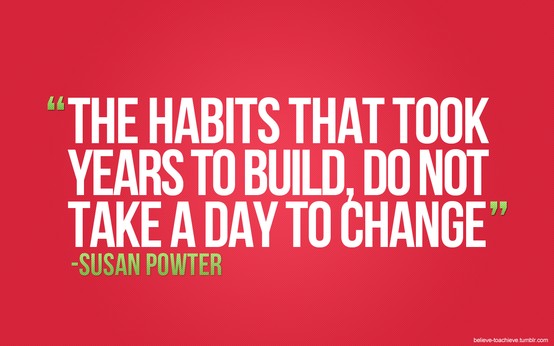
To get the best results, incorporate dietary changes gradually. Eventually, the cravings will stop and it won’t matter if those foods disappear entirely. The brain gets used to the fact that it will no longer get the rewards it got in the past. As the person completely cuts the unhealthy stuff out of their diet, their chances of success go up exponentially.
Keeping any weight off is almost more difficult than losing weight in the first place (Biggest Loser, anyone?). Obstacles will pop up that could derail a person’s progress, but they can easily be overcome. A person has to admit that they’re powerless against food and reclaim that power. You may be familiar with this concept, as it’s borrowed from other addiction treatments. The road to recovery might seem endless. Like anything else – a fitness journey, earning a degree, mastering a new skill – if you’re is committed, you’ll get to where you want to go.
The process might take a long time, but it’s one that’s worth it when you consider what’s waiting at the end. Losing weight is not just beneficial for the person who’s losing the weight, it benefits their family and friends too!
The positivity that is brought into a person’s life when they stop overeating is immeasurable. I hope we’ve all had the experience of positivity being contagious!
[Tweet “Believe it or not, food can actually be addicting! #fitfluential”]
***
I’m fascinated with the concept of food as an addiction… it makes so much sense though!
Have you ever heard of Overeaters Anonymous?
What are your thoughts on food as an addiction… is it a thing?


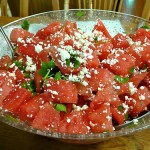
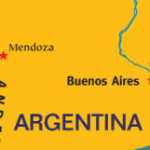
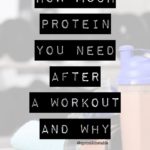
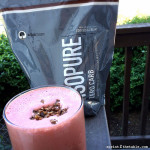
When I was a resident advisor I had a number of women on my hall who were in OA.
When I was a trainer I had a number of clients who were in OA.
For the former I was shocked (Id not heard of it yet. Id never thought the 12 steps could be applied to food!) for the latter Id already learned and knew how powerfully helpful it could be for many many many.
<3
It is amazing to me how MANY things the 12 steps can be applied to. Do you have a post on this? It feels like a Carla post… you’re wise like that. :*
wonderful post! thank you. I believe in cake and dessert very often, especially when a real good craving comes along. Ignoring cravings does not work and cutting out the foods you love doesn’t work so good either! finding balance is a tough one and being okay with indulging and then getting right back on track is not easy for people to do.
I think getting bak on track for people is especially hard because they’re like :oh well… already blew it, may as well keep on.” But it’s like anything in life – you mess up, you acknowledge it, and you move on.
I’ve seen the OA ads in newspapers. I totally think that overeating is an addiction. It’s a drug!
I love it! Yeah, food is an addiction and I realized that when I decided to change my eating habits years ago.
There’s no better diet than the “no shit” diet indeed.
No Shit diet all the way. I have a problem with overeating. Not to the extent of a real binge disorder, not by any means, but I cannot stop if food is in front of me (once I start). Food addiction is so hard to deal with because we need food to survive. You can’t just avoid it all together, like alcohol. But we are, as a society, conditioning everyone to become overeaters, to be obsessed with food, because of how it fuels our economy.
I hear you – it’s like it just looks so yummy I need ALL OF IT! I try to just not keep those things around. Something successfully, sometimes notsomuch.
I have absolutely heard of it and, after working as a personal trainer for almost 10 years, I know it is the truth!! It’s definitely a process and the person has to WANT it badly enough to do it for themselves, which can sometimes be the hardest part. But I 100% agree with having cake and wine in moderation. You can’t suck ALL the joy out of eating or you will surely fail!
Spoken like a true Italian! 🙂
It’s definitely an addiction. I still have foods I cannot keep in the house like chips otherwise I’ll eat the entire bag in one sitting. But the real kicker is after years of healthy eating, I don’t even crave foods like anymore and get bloated and funcomfortable when I do eat them.
I have heard of a food addiction but your post gave me so much more insight on that. It’s so unfortunate that it’s such a problem today!
Love this post, Laura! I absolutely think food addiction is a thing and it’s something I’ve seen many people struggle with. I love your healthy approach to eating as I agree that most people fail in trying to be too restrictive with their diets overnight – it’s just a recipe for disaster!
Thanks Tara! It’s a big thing, particularly for Americans I think. We’ve lost all sense of portions.
We tend to not keep crap in the house. I grew up with the “moderation is key” philosophy. My husband grew up believing that a pint of ice cream was a single serving. But it’s not just about weight. His family has never had weight struggles. They do get type II diabetes though.
That blows my mind – how some people eat all that and never have weight struggles but then they get diabetes. Goes to show you that weight isn’t the only indicator of health!
i think food is an addiction. or things in food can cause us to feel addicted, etc. like sugar, alcohol, etc. It’s such a mind body connection. And these are valid points. We need to be AWARE and focus on how we truly feel when eating and slow down and savor. Why we should all move to europe. Well not Britain . 😉
I nearly spewed my (moderately poured) glass of wine when I read this. LMAO!
Sound advice lady! Yes, having studied nutrition, I know that food addiction is absolutely a real thing. The parts of the brain that are stimulated and chemicals that are produced when we eat high fat/sugary/salty foods are the same responses people get from doing drugs… hence where the addiction comes in! It’s actually way more of a complicated issue than a lot of people assume. Our bodies are wired to crave high calorie foods because they haven’t caught up with modern times where most people aren’t worried about when they’re going to eat next. They want to eat as much as they can in the moment in case it faces a fast where it needs that energy later. And as we know, food is life and has so many ties to culture and childhood and positive memories… It’s all very interesting!
Ohhhh… I’ve never even thought about it from an evolution perspective but that makes so much sense. The psychological thing I have thought about a lot – it’s a real struggle to re-train yourself to seek comfort or reward outside of food.
yea i have OA group at my work, they meet off hours in our cafeteria….i agree with 100% about healthy eating shouldnt that complicated..its just eat unprocessed food most of the time and enjoy your wine/cake/whatever makes you happy. in my practice, i have seen that people use food as a tool to deal with their primary problem – be it stress, confidence issue, depression, anxiety etc and it is so important for people to first fix that than try different diet etc to solve their addiction with food.
That’s a great point – so often it’s a bandaid for something bigger.
OA is not just about overeating. It’s about an unhealthy relationship with food. I’ve been a part of OA for years and years and there’s plenty of anorexics, bulemics, compulsive exercisers, etc. there as well. A lot of anorexics don’t realize there’s a free 12 step based program available to them b/c so many people assume OA = just overeating.
Yes – thank you for bringing that up. And it’s so true for any addiction program. There are many components of any bad habit or addiction we develop.
GREAT post! I totally believe in OA, and I know i struggle with overeating on occasion. Ever since my “fat” days, it was an issue for me. Now, I know I have triggers and normally I can stay away from them. But, I’m learning some are still there and I can’t have certain things in the house at all.
Thanks! I think a lot of us do. It’s a coping mechanism, like drinking or drugs. The more we can talk about it, the better off we are!
I actually had a severe binge eating disorder in college and 12 years later there are times it is still tough and I fall back into those ways. My overall goal is what you said – a healthy lifestyle that still allows for little indulgences here and there so nothing feels off limits.
I had no idea! I think a lot of use struggled with that in college… it’s such a stressful time and you’re trying to be a “grown up” and deal with it alone.
I think food addiction is real. I have a colleague that truly does have a problem and deals with all of her life-stresses by eating (and eating). I could go on about some of her other habits, too, but will refrain. Gotta have some cake and wine in moderation, right?
Very good post! I used to work in the eating disorders field and dealt with lots of clients with overeating issues.
I can wholeheartedly resonate with this. Food addiction is a crazy thing that many people don’t understand and think it’s just something people can stop. It’s not. I’ve been through it.
Preach woman, preach!
Of course food is an addiction, and I think in order to overcome it, you need to find out what it brings you (comfort, satisfaction, stress relief, etc.). Getting to the root of the problem will truly allow you to fix it.
Now please pass me a glass of wine and some cake. 🙂
YES! We try to bandaid everything as a society. We need to be comfortable with admitting we have weaknesses and dealing it the root issues.
Cheers.
Food as an addition makes SO much sense and I think it would be a hard thing to get treatment for because it’s not as easily recognizable as a disease or addition. I love your No Sh*t diet concept!
I can definitely see the parallels between food addiction and drug/alcohol abuse. A lot of people become addicted to things because they’re trying to soothe, mask, or dampen negative emotions or events in their lives. Much like people will drink to forget their bad day or depression, people use food for the same reason. Really, I think any time you’re avoiding the actual problem by using drugs, alcohol, food, or even exercise instead, if you have an addictive personality it can become a real issue.
I personally subscribe to the no shit diet as well, though I never called it that before. I most definitely will now 😉
Food addiction is definitely real. All the more reason to treat health and fitness from a mental and emotional approach rather than force people to do actions that their minds are not “wired” to doing.